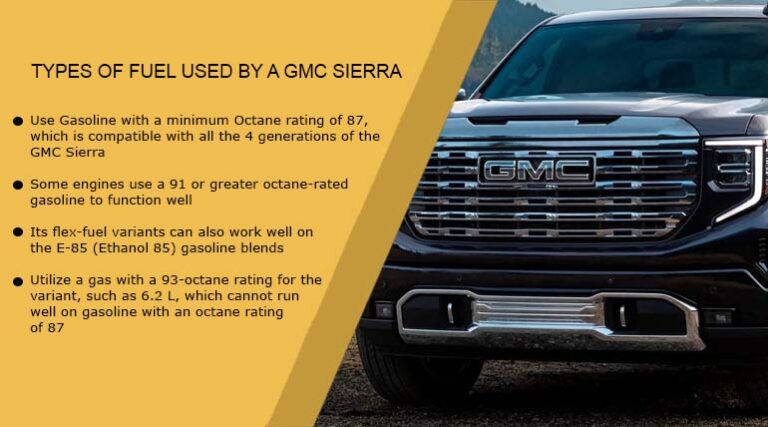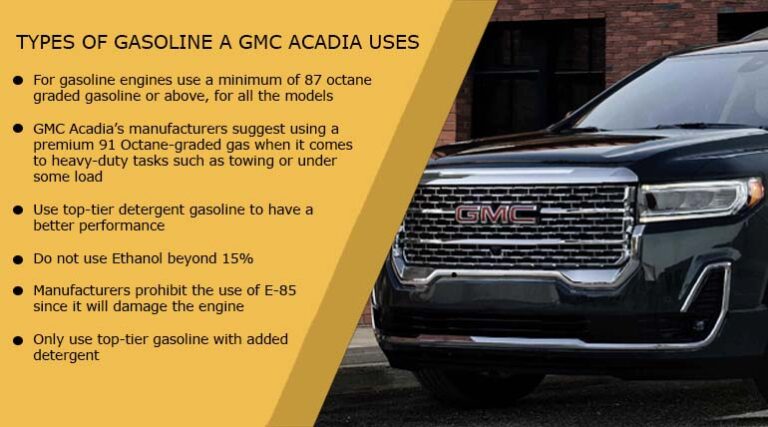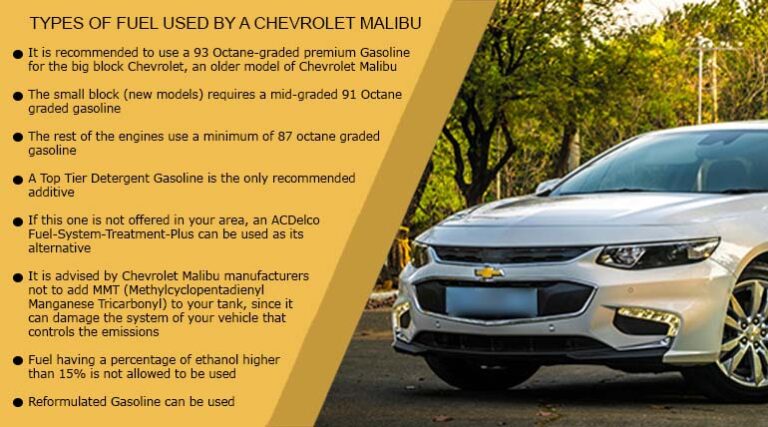Types of Fuel All Generations of Ford F-150 Take – Explained!
This piece will cover all you want to know about the exact types of fuel the Ford F-150 takes. However, before moving to the details, let’s first briefly introduce the Ford F-150. To learn about this vehicle brand in the market.
Ford F-150 is an amazing and luxurious pick-up truck that captivates hearts. Ford marketed and introduced since 1975. This truck is safe and will not cost you much during repairs. Ford F-150 has an attractive interior, safety rating, and features it offers to its drivers.
A Quick Overview!
Let’s go through the key points of this article regarding the correct types of fuel Ford F-150 takes;
Use a minimum of 87 octane-graded gasoline (Regular, unleaded) for all of its generations made from the year 1996 till present. Ford F-150 is super-charged, and for those produced after 2012, gasoline with 91 Octane grading is recommended, though they can function on gasoline with 87 octane-rating. Ethanol-85 (E-85) is only suggested for the manufactured engines to run on it (Flex-Fuel). The best additive to use is Top-Tier detergent gasoline. An Ultra-low, Sulfur diesel, up to 15 parts per million (ppm), is the required fuel for diesel-based engines. Though, only when it comes to towing, a heavy-duty task, or during hot-summer temperatures, gasoline with 91 Octane grading or higher (93) is highly recommended for more efficient performance.
Related Article: 5 Most Shocking Problems of Ford F-150 4×4 Actuator
Types of Fuel All Generations of Ford F-150S Take
Below are given detailed answers to all of your queries, from which types of fuel the Ford F-150 takes. Data has been collected using authentic resources and reviews of people around the globe. So that you can get maximum from your Ford F-150.

Fuel Type Based on Ford F-150 Engine Type
Based on your Ford F-150 engine, the correct type of fuel is opted for. Below are details regarding the engines offered by the Ford F-150’s entire four generations and the compatible fuel, either gasoline or diesel, according to its specific generation, models, and engine type.
The Ford F-150 1st Generation-1996 to 2004
Engines manufactured between 1996 to 2004 include 4.2 L V-6 and 4.6 L V-8, utilizing a minimum of 87 octane-graded gasoline (Regular, unleaded). An engine, such as a 5.4 L super-charged V-8, functions well on a 91 Octane-graded or higher gasoline.
The Ford F-150 – 2nd Generation-2004 to 2008
Ford F-150’s second generation model engines manufactured between 2004 to 2008 include 4.2 L V-6 and 4.6 L V-8, utilizing a minimum of 87 octane-graded gasoline (Regular, unleaded). An engine, such as a 5.4 L super-charged V-8, functions well on a 91 Octane-graded or higher gasoline but can also operate on a regular 87-octane. For a yellow-colored fuel tank cap, indicating a flex-fuel, an Ethanol-85 (E-85) fuel is compatible, mixed with 15 percent gasoline (regular).
The Ford F-150 – 3rd Generation-2009 to 2012
Ford F-150’s third-generation model engines manufactured between 2009 to 2012 include 4.6 L V-8, 5.4 L V-8, and 6.2 L V-8 engines, which utilize a minimum of 87 octane-graded gasoline (Regular, unleaded). Flex-fuel machines are compatible with E-85 fuels.
The Ford F-150 – 4th Generation-2012 till Present
Ford F-150’s fourth-generation model engines, which is the latest one, manufactured between the model years 2012 till present, include 2.7 L EcoBoost, 3.3 L EcoBoost, 3.5 L EcoBoost, 3.7 L V-6, 5.0 L V-8, and 6.2 L V-8 engines. All of these function well on a minimum of 87 octane-graded gasoline (Regular, unleaded). Gasoline with a 91 or greater octane rating is suggested for better performance. Flex-fuel engines are compatible with E-85 fuels.
F-150 models manufactured by Ford between the years 2020 and presently comprise of 3.0 L power-stroke V-6 Engine, a Diesel-based engine requiring an Ultra-low, Sulfur diesel, abbreviated as USLD, up to sulfur 15 parts per million (ppm), to function well.
Which Varieties of Fuel Should Be Used and Are Compatible with Ford F-150?
Today, we have a variety of types of fuel the Ford F-150 takes. From Reformulated Fuel (RFG) to different additives and blends. But does Ford recommend any of these for its Ford F-150 models and generations? Let’s sort out all of your confusion.
Ford F-150 Suggested Fuel and Additives
Top-tier detergent gasoline is highly recommended by the Ford F-150, which keeps the engines clean and away from debris. A minimum of 87 octane-graded gasoline (Regular, unleaded) is recommended for all of its generations. Ford F-150, which is super-charged and specifically produced after 2012, has gasoline with 91 Octane grading recommended, though they can function on gasoline with 87 octane-rating.
Most of the data given below regarding the models made from 2012 to the present are derived from the owner’s manual from 2021. But these are still applicable to the previous generations as well. It is crucial to consider your vehicle’s manual properly before opting for a fuel type and its compatibility with your Ford F-150’s model.
Recommended Diesel Fuel for a Ford F-150’s Diesel Engine
Diesel fuel should undoubtedly be used when driving an F-150 based on a diesel engine. Recommended diesel fuel for the Ford F-150 by the Ford includes; an Ultra-low, Sulfur diesel, abbreviated as USLD, up-to sulfur 15 parts per million (ppm). It is designated by numbers 1D or 2D. Another one is Biodiesel, which Ford recommends using at most 20% for its Ford F-150. LSD (low sulfur diesel) and HSD (high sulfur diesel) are strictly not recommended.
Reformulated Gasoline Fuel (RFG)
With a nature-friendly impact and for cleaner and greener burning, Reformulated Gasoline (RFG) is produced, which causes decreased smog and less toxic pollutants than regular gasoline, having no negative impacts. It is said to increase the miles per gas number of your vehicle. It is also best recommended for the area having smog at a higher concentration to decrease air pollution.
E-85 or Gasoline/Oxygenated Blends
Oxygenation blends can be used in your Ford F-150, but their usage requires some regulations and rules to follow. If your F-150 is not flex-fuel, consuming gasoline with at most 10 to 15 percent of ethanol is recommended. But if your F-150 is a flex-fuel, it is compatible with Ethanol-85 (E-85). But even for a flex-fuel vehicle, fuel exceeding 85% Ethanol is not recommended.
Gas with Added Materials
To keep your engine clean, safe, and up to the standards of emission, TOP-TIER detergent gasoline is highly recommended by Ford for its Ford F-150. It is suggested by Ford to utilize a gas mixed with a large concentration of agents used for cleaning. These are easily available with your nearest top-tier retailers. Additives prohibited from being used include methanol, silicon, and any metal-based ones.
Gasoline having Methyl-cyclopentadienyl Manganese Tri-carbonyl, abbreviated as MMT, was used to improve the octane of fuel with poor quality. It was also used to seize the knocking noise produced by engines back then. But as of today, manufacturers of the Ford F-150 say not to add this one to your tank since the presence of the metal Manganese in this additive can damage your vehicle’s system, programmed to regulate emissions.
Biodiesels
Biodiesel oils are very nature friendly since they are derived from cooking oil (wasted), vegetable, and soybean oils, through a process called “Trans-esterification.” It is only compatible with diesel-based engines offered by Ford for its Ford F-150. Ford recommends using less than 20% of Biodiesel (by volume), with diesel (the regular one) for its Ford F-150. If one wants to consume a maximum of 20 percent of Biodiesel, an adjustment is required for the maintenance schedule of one’s Ford F-150. The storage of Biodiesel for more than a month is high and not advised by the Ford manufacturers.
Question and Answer Section!
What If My Engine Knocks Afterwards Refilling?- A “Knocking-Noise” After Refueling! What Does It Indicate?
If one uses lower octane-rated gasoline in your Ford F-150, it degrades the performance and economy of the engine. Gasoline will burn prematurely if put a lower octane gas in an engine with higher compression, causing an unsmooth burn and engine knock. Hence, it is extremely crucial to use the correct gasoline fuel with accurate octane grading. I heard a fainted-knocking sound from the engine; it indicated no danger. if you hear a loud knocking sound; then it is due to a lower quality and lower octane-rate gasoline. To diminish the knocking-like noise, fill up the tank with premium or mid-rated octane gasoline.
Can All the Generations of Ford F-150 Consume RFGs as Fuel?
You must be pondering if all four generations of Ford F-150 are suitable for using Reformulation Gasoline Fuel, so the answer is YES! It has been suggested to consume RFG for all generations of your Ford F-150.
You may also want to read: Recurrent Problems of Ford F-150 Raptor
How to Locate a Flex-Fuel Vehicle?
- A yellow bezel surrounding the inlet of the fuel tank indicates that your vehicle is flex-fuel. If you cannot find it there, you can also check out your fuel tank’s door.
- If your Ford F-150 has a Flex-Fuel emblem and a yellow gas tank cap, it signifies it is E-85 compliant and safe to utilize E-85 Fuel.
- But keep in mind to burn all the flex-fuel when you run your vehicle on regular gas, and don’t add less than 3 gallons of flex-fuel in your tank while refilling.
FORD F-150 DRIVERS’ REVIEWS AND CHOICES! Regular, Mid-Grade, or Premium Gasoline?
After conducting revisions from numerous forums and reviews of the people using Ford F-150 around the world, the conclusion is that; some find regular, unleaded gasoline with an 87 Octane-rating to work well for them. But the ones using gasoline with 91 or higher Octane have proved to work much better for them. Especially for the F-150 models manufactured post-2012.
Hence, regular and mid-graded gas can be used. It has been declared by many experienced F-150 drivers that there is no need to consume 93 premium gasoline. Going on a less than 87 octane gas exploits the engine’s performance.
EcoBoost engines for the current generations have run well on a mid-grade 91 Octane gas. Though, only when it comes to towing, a heavy-duty task, or during hot-summer temperatures, gasoline with 91 Octane grading or higher (93) is highly recommended for more efficient performance.
Conclusion
To conclude, Ford F-150 is an amazing and luxurious pick-up truck that captivates hearts. Ford marketed and introduced it back in 1975. This truck is safe and will not cost you much during repairs. Ford F-150 has an attractive interior, safety rating, and features it offers to its drivers.
Hence, about the types of fuel the Ford F-150 takes; use a minimum of 87 octane-graded gasoline (Regular, unleaded) for all generations made from the year 1996 till the present. Ford F-150, super-charged after 2012, uses 91 Octane grading, though it can function on gasoline with 87 octane-rating.






